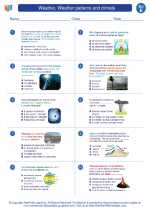Weather, Weather patterns and climate -> psychiatry
Psychiatry: An Overview
Psychiatry is a branch of medicine that focuses on the diagnosis, treatment, and prevention of mental, emotional, and behavioral disorders. Psychiatrists are medical doctors who specialize in the field of psychiatry and are trained to assess, diagnose, and treat individuals with mental health conditions.
Key Concepts in Psychiatry
- Mental Disorders: Psychiatry deals with a wide range of mental disorders, including depression, anxiety, schizophrenia, bipolar disorder, and more.
- Assessment and Diagnosis: Psychiatrists use various assessment tools and diagnostic criteria to evaluate and diagnose mental health conditions.
- Treatment Modalities: Treatment options in psychiatry include psychotherapy, medication, and other interventions tailored to the specific needs of the individual.
- Prevention and Education: Psychiatric professionals also focus on preventive measures and mental health education to promote overall well-being.
Study Guide
Here are some key topics to study in psychiatry:
- Overview of Mental Disorders
- Diagnostic Tools and Criteria
- Treatment Modalities in Psychiatry
- Psychiatric Disorders in Children and Adolescents
- Psychosocial Factors in Mental Health
- Legal and Ethical Aspects of Psychiatry
Understanding these topics will provide a comprehensive foundation in psychiatry and mental health care.
As you study psychiatry, it's important to engage in critical thinking and consider the holistic well-being of individuals with mental health concerns.
Good luck with your studies!
.◂Science Worksheets and Study Guides Fifth Grade. Weather, Weather patterns and climate
Study Guide Weather, Weather patterns and climate
Weather, Weather patterns and climate  Worksheet/Answer key
Worksheet/Answer key Weather, Weather patterns and climate
Weather, Weather patterns and climate  Worksheet/Answer key
Worksheet/Answer key Weather, Weather patterns and climate
Weather, Weather patterns and climate  Worksheet/Answer key
Worksheet/Answer key Weather, Weather patterns and climate
Weather, Weather patterns and climate  Vocabulary/Answer key
Vocabulary/Answer key Weather, Weather patterns and climate
Weather, Weather patterns and climate  Vocabulary/Answer key
Vocabulary/Answer key Weather, Weather patterns and climate
Weather, Weather patterns and climate  Vocabulary/Answer key
Vocabulary/Answer key Weather, Weather patterns and climate
Weather, Weather patterns and climate  Vocabulary/Answer key
Vocabulary/Answer key Weather, Weather patterns and climate
Weather, Weather patterns and climate  Vocabulary/Answer key
Vocabulary/Answer key Weather, Weather patterns and climate
Weather, Weather patterns and climate 

 Worksheet/Answer key
Worksheet/Answer key
 Worksheet/Answer key
Worksheet/Answer key
 Worksheet/Answer key
Worksheet/Answer key
 Vocabulary/Answer key
Vocabulary/Answer key
 Vocabulary/Answer key
Vocabulary/Answer key
 Vocabulary/Answer key
Vocabulary/Answer key
 Vocabulary/Answer key
Vocabulary/Answer key
 Vocabulary/Answer key
Vocabulary/Answer key

The resources above cover the following skills:
Earth Systems Science
Earth's surface changes constantly through a variety of processes and forces. Students can:
Analyze and interpret data identifying ways Earth's surface is constantly changing through a variety of processes and forces such as plate tectonics, erosion, deposition, solar influences, climate, and human activity
Develop and communicate an evidence based scientific explanation around one or more factors that change Earth's surface